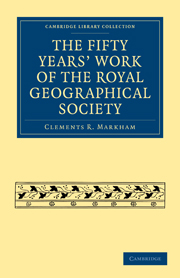Book contents
- Frontmatter
- Contents
- CHAPTER I THE FATHERS OF ENGLISH GEOGRAPHY
- CHAPTER II THE ROYAL SOCIETY
- CHAPTER III THE AFRICAN ASSOCIATION
- CHAPTER IV THE RALEIGH CLUB
- CHAPTER V FOUNDATION OF THE ROYAL GEOGRAPHICAL SOCIETY
- CHAPTER VI PRESIDENTS AND SECRETERIES OF THE ROYAL GEOGRAPHICAL SOCIETY, 1830–50
- CHAPTER VII PRESIDENTS AND SECRETARIES OF THE ROYAL GEOGRAPHICAL SOCIETY, 1851 TO 1881
- CHAPTER VIII EXPEDITIONS PROMOTED BY THE ROYAL GEOGRAPHICAL SOCIETY, AND GRANTS OF THE ROYAL AWARDS, 1830–55
- CHAPTER IX EXPEDITIONS PROMOTED BY THE ROYAL GEOGRAPHICAL SOCIETY AND GRANTS OF THE ROYAL AWARDS, 1855–1880
- CHAPTER X PUBLICATIONS OF THE SOCIETY—LIBRARY AND MAP ROOM—EDUCATIONAL MEASURES
- CHAPTER XI PROGRESS OF THE SOCIETY
- CHAPTER XII COMPARATIVE VIEW OF GEOGRAPHICAL KNOWLEDGE IN 1830 AND 1880, WITH A NOTICE OF THE WORK THAT STILL REMAINS TO BE DONE
- APPENDIX
CHAPTER XI - PROGRESS OF THE SOCIETY
Published online by Cambridge University Press: 29 August 2010
- Frontmatter
- Contents
- CHAPTER I THE FATHERS OF ENGLISH GEOGRAPHY
- CHAPTER II THE ROYAL SOCIETY
- CHAPTER III THE AFRICAN ASSOCIATION
- CHAPTER IV THE RALEIGH CLUB
- CHAPTER V FOUNDATION OF THE ROYAL GEOGRAPHICAL SOCIETY
- CHAPTER VI PRESIDENTS AND SECRETERIES OF THE ROYAL GEOGRAPHICAL SOCIETY, 1830–50
- CHAPTER VII PRESIDENTS AND SECRETARIES OF THE ROYAL GEOGRAPHICAL SOCIETY, 1851 TO 1881
- CHAPTER VIII EXPEDITIONS PROMOTED BY THE ROYAL GEOGRAPHICAL SOCIETY, AND GRANTS OF THE ROYAL AWARDS, 1830–55
- CHAPTER IX EXPEDITIONS PROMOTED BY THE ROYAL GEOGRAPHICAL SOCIETY AND GRANTS OF THE ROYAL AWARDS, 1855–1880
- CHAPTER X PUBLICATIONS OF THE SOCIETY—LIBRARY AND MAP ROOM—EDUCATIONAL MEASURES
- CHAPTER XI PROGRESS OF THE SOCIETY
- CHAPTER XII COMPARATIVE VIEW OF GEOGRAPHICAL KNOWLEDGE IN 1830 AND 1880, WITH A NOTICE OF THE WORK THAT STILL REMAINS TO BE DONE
- APPENDIX
Summary
Finance—Members—Meetings—House Accommodation.
The power of forwarding the objects of the Society, of accumulating geographical information and making it available, of furthering and assisting exploration and discovery, depends upon the support received by the Society from the public. It is only on the condition that the Geographical Society's work is felt and recognised to be work of national importance, that it can be efficiently and continuously performed. The great object of the Founders of the Society, and of their Successors, has been, by activity and diligence, to establish the Society's reputation, and to prove the value of its labours. Through evil report and through good report, the work has been steadfastly pushed forward during half a century; and successive Members of the Council have given their time and abilities, in ungrudging measure, to the Society's business. It is this unostentatious work, this attention to the measures for increasing the number of Members, to financial details, and to administrative business, upon which the prosperity and well-being of the Society is founded.
The Society commenced its operations with 460 Members in 1830, the admission fee being 3l., the annual subscription 2l., which might be compounded for by one payment of 20l. In the first two years, from July 1830 to March 1832, the receipts amounted to 5239l., and it was the original plan of the Council to form a reserve fund by investing the sums received as compositions, and to meet current expenses with the amount represented by annual subscriptions.
- Type
- Chapter
- Information
- The Fifty Years' Work of the Royal Geographical Society , pp. 111 - 115Publisher: Cambridge University PressPrint publication year: 2009First published in: 1881



